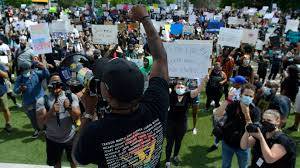Washington, other US cities gear for more protests over police brutality

Stay tuned with 24 News HD Android App

Protestors streamed toward the White House and other Washington locations on Saturday for huge demonstrations over the death of George Floyd and issues of inequality for black Americans, as the movement triggered by his killing at police hands entered a second weekend.
With protests in solidarity underway around the world, from Sydney to London, police closed off a wide area around the White House, which is now behind a new barrier of black metal grates, ahead of a mid-day demonstration expected to draw tens of thousands of people on an oppressively hot and sunny day.
An even larger demonstration was underway near the Lincoln Memorial on the National Mall, with some protesters moving toward the massive stone memorial to civil rights icon Martin Luther King Jr.
Protests were expected all around the nation, including in New York, Miami and Minneapolis, where Floyd was killed while in police custody on May 25.
The demonstrations in Washington were expected to be the biggest since the protests began nine days ago.
Also on Saturday a remembrance for Floyd was being held in Raeford, North Carolina, the state where he was born, following an initial ceremony in Minneapolis on Thursday.
Hundreds of people waited in line there to view Floyd's coffin, some holding umbrellas to ward off the hot sun on the steamy East Coast, news reports said. Some sobbed and many held their cell phones high in the air as a hearse arrived with the casket.
Outside the White House, protestors crowded in front of the fences around the presidential mansion. Some attached pictures of Floyd and other blacks killed by police to the tall black barrier.
Patricia Thompson, a 55-year-old African-American who came with her niece and nephew, said she hoped this was a turning point in US history.
"I feel like we’ve been fighting, fighting, fighting, and all of a sudden, everything just broke through," she said, referring to corporations and organizations that for the first time have taken a public stand against institutional racism.
The protests were sparked by videos of a police officer kneeling on Floyd's neck for almost nine minutes as he pleaded for his life -- the latest case of white law enforcement authorities being blamed for the death of an unarmed black person.
The resultant rage has exploded into the most serious civil unrest in America since King was assassinated by a white man in 1968.
It also comes amid the coronavirus pandemic, in which non-whites have died in disproportionate numbers and lost their jobs more readily than whites as the economy tanked due to lockdown measures.
On Friday, Mayor Muriel Bowser of Washington, who has clashed with President Donald Trump over his hard-line handling of the unrest, unveiled a street mural that reads "Black Lives Matter" in giant yellow letters on the road leading directly to the presidential mansion.
Abroad, protesters echoed the rage of the American demonstrators.
Taking a knee, chanting and ignoring social distancing measures, outraged protesters from Sydney to London kicked off a weekend of global rallies against racism and police brutality.
Londoners protested outside Parliament and planned to rally on Sunday in front of the US embassy on the opposite bank of the Thames River.
In Australia, aboriginal protesters performed a traditional smoking ceremony at the start of a "Black Lives Matter" protest in Sydney, which was sanctioned at the last minute after initially being banned on health grounds.
Back in the US, new police excesses caused more anger.
In Buffalo, New York, two policemen were suspended without pay after a video showed them shoving a 75-year-old protester who fell, suffered a head injury and began bleeding from the ear.
In Indianapolis, police launched an investigation after a video emerged showing at least four officers hitting a woman with batons and firing pepper balls at her on Sunday night.
And on Thursday in New York City, officers baton-charged dozens of peaceful protesters defying a curfew in the Bronx after pinning them in, leaving them with nowhere to run, several reports said.
- 'Out of control' -
The unrest has handed Trump one of the greatest challenges of his tumultuous presidency.
While condemning Floyd's death, he has adopted a tough stance toward protesters, calling them "thugs" or "terrorists" at one point, and has been accused of exacerbating tensions.
US civil rights groups have filed a suit against Trump after security forces fired pepper balls and smoke bombs to clear peaceful demonstrators in Washington before the president walked to a nearby church for a photo op earlier this week.
Some of the early protests were marred by rioting and looting but most have been peaceful since then.
Curfews have been lifted in Washington, Los Angeles and other cities, but New York's is due to run for the next three nights.
